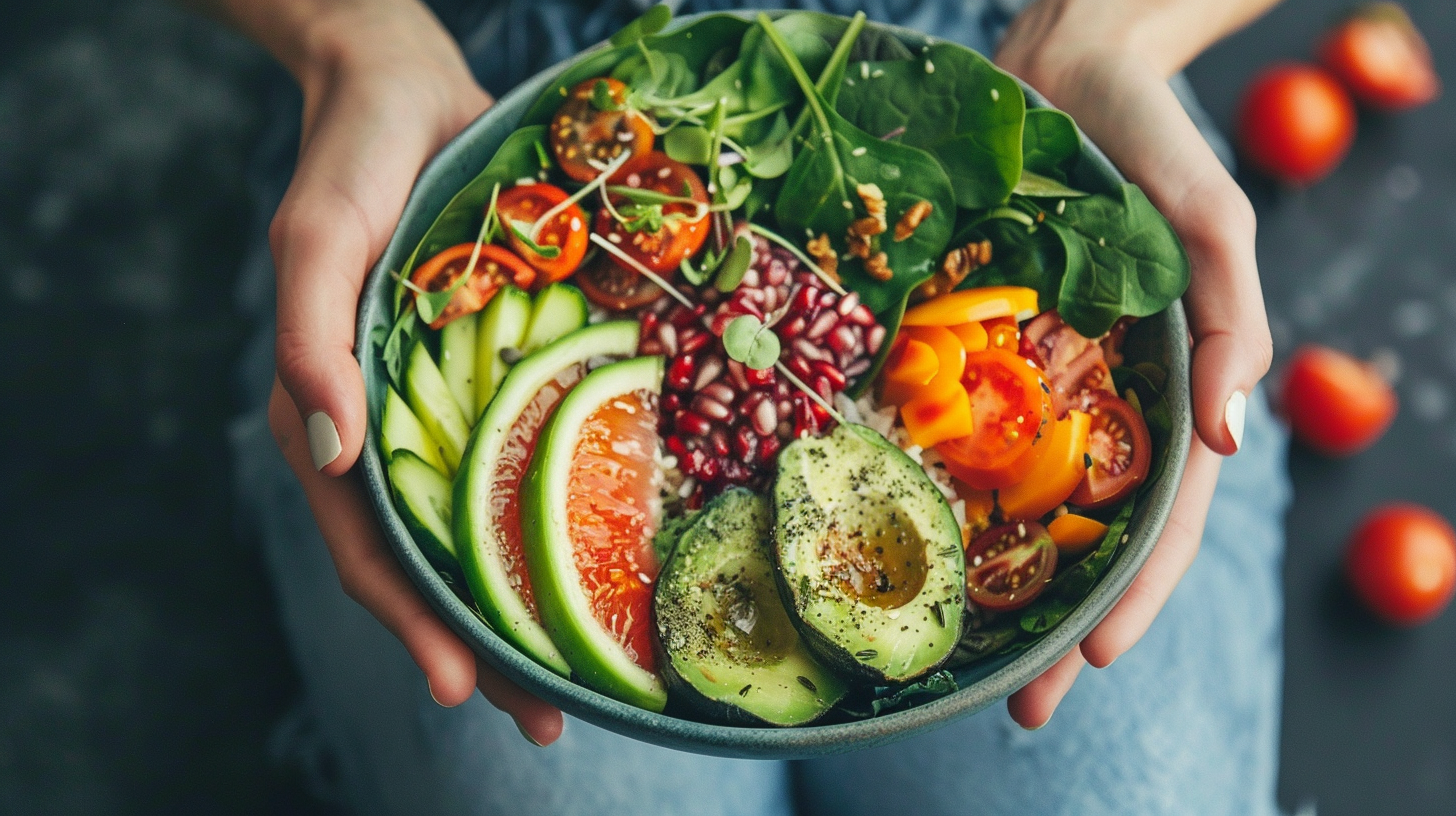Table of Contents Show
There may be products. Products are independently selected by our editors. We may earn an affiliate commission from the links with no charge to you, example: as Amazon Affiliate.
Fad diets harm our bodies with quick fixes, leaving us drained and irritable from restrictions. These trends don’t support sustainable health and can lead to metabolic issues and nutrient deficiencies, affecting our energy levels and focus. Embracing intuitive eating is a healthier approach where we focus on nourishing our bodies and fostering a positive relationship with food. It offers a better path towards overall well-being.
Key Takeaways
- Embracing intuitive eating honors hunger and fullness cues.
- Intuitive eating promotes long-term lifestyle changes over quick fixes.
- Self-compassion combats food guilt in intuitive eating practices.
- Cultivating self-esteem beyond appearance breaks free from size equated worth.
- Healthy relationships with food are fostered by intuitive eating practices.
The Dangers of Fad Diets
When I tried following a fad diet, I quickly realized the harmful effects it had on my body. Initially, the promises of quick weight loss seemed appealing, but as I restricted certain food groups and drastically cut my calorie intake, I felt fatigued and irritable. My energy levels plummeted, impacting my ability to focus and engage in daily activities. Not only did I struggle with physical exhaustion, but my mental health suffered too. The constant thoughts about what I could or couldn’t eat consumed my mind, leading to feelings of guilt and anxiety whenever I deviated from the strict diet rules.
Moreover, the fad diet left me deficient in essential nutrients, causing my hair to become brittle, my skin to lose its glow, and my nails to chip easily. Despite initially losing some weight, the negative impact on my overall well-being was undeniable. This experience taught me the importance of nourishing my body with a balanced and sustainable approach to eating rather than falling for the enticing yet harmful promises of fad diets.
Impact on Metabolism and Nutrient Deficiency
Experiencing the aftermath of a fad diet, I noticed a significant impact on my metabolism and the development of nutrient deficiencies. My body felt sluggish, and I struggled to maintain my energy levels throughout the day. The restrictive nature of the diet left me deficient in essential vitamins and minerals, leading to various health issues.
Here are some key points to consider regarding the impact of fad diets on metabolism and nutrient deficiency:
- Metabolic slowdown: Fad diets often lead to a decrease in metabolic rate, making it harder to lose weight in the long term.
- Muscle loss: Rapid weight loss from fad diets can result in muscle breakdown, further slowing down metabolism.
- Nutrient deficiencies: Restrictive eating patterns can cause deficiencies in vital nutrients like iron, calcium, and vitamin D.
- Hormonal imbalances: Fad diets may disrupt hormone levels, affecting metabolism and overall health.
- Risk of chronic diseases: Prolonged nutrient deficiencies from fad diets can increase the risk of developing chronic conditions like osteoporosis and anemia.
Psychological Effects of Yo-Yo Dieting
Yo-yo dieting can significantly impact one’s self-image, leading to feelings of dissatisfaction and low self-esteem.
The emotional ups and downs that come with constantly dieting can create a rollercoaster effect on one’s mental well-being.
Moreover, these repeated cycles of weight loss and gain can strain relationships as individuals may struggle with mood swings and self-worth tied to their changing appearance.
Negative Self-Image Impact
During periods of yo-yo dieting, I often struggle with a negative self-image, which can have lasting psychological effects. This constant cycle of losing and gaining weight not only affects my physical health but also takes a toll on my mental well-being. Here are some ways in which negative self-image impacts individuals during yo-yo dieting:
- Decreased Self-Confidence: Constantly fluctuating in weight can lead to feelings of inadequacy and low self-esteem.
- Body Dissatisfaction: The inability to maintain a stable weight may result in dissatisfaction with one’s body image.
- Comparison to Others: Constantly comparing oneself to others’ bodies can exacerbate feelings of negativity.
- Self-Criticism: Engaging in harsh self-criticism for not being able to sustain weight loss can be detrimental.
- Isolation: Feeling embarrassed about weight fluctuations may lead to social withdrawal and isolation.
Emotional Rollercoaster of Dieting
Navigating the ups and downs of fad diets can be an emotionally taxing journey, impacting both mental well-being and self-perception. The constant cycle of restriction and indulgence can lead to feelings of guilt, shame, and failure.
Initially, the promise of quick results might spark excitement and motivation, but as the diet progresses, frustration and disappointment often set in. The pressure to adhere to strict rules can create anxiety and a sense of inadequacy when slip-ups occur.
Yo-yo dieting not only affects how we see ourselves physically but also takes a toll on our emotional state, causing fluctuations in mood and self-esteem. This rollercoaster of emotions can leave individuals feeling drained, discouraged, and trapped in a cycle that’s difficult to break.
Relationship Strain From Dieting
Experiencing the psychological effects of yo-yo dieting can strain relationships and impact one’s overall well-being. The constant cycle of losing and gaining weight takes a toll not only on oneself but also on those around us. Here are some ways in which relationship strain can manifest:
- Increased irritability and mood swings affect interactions with loved ones.
- Feelings of guilt or shame from failed diet attempts may lead to social withdrawal.
- Loved ones might feel helpless or frustrated by the constant dieting struggles.
- Unrealistic body image expectations can create tension in romantic relationships.
- Lack of energy and focus due to restrictive diets can hinder quality time spent with family and friends.
Relationship With Food and Body Image
My connection with food and how I view my body greatly impacts my overall well-being and mindset. Growing up, societal standards often influenced my perception of what a ‘perfect’ body should look like. This led to a complicated relationship with food, swinging between restrictive eating and guilt-ridden indulgence. Constantly comparing myself to unrealistic ideals took a toll on my mental health, fostering negative body image and self-esteem issues.
As I began embracing intuitive eating, I started listening to my body’s cues and nourishing it without judgment. This shift not only transformed my eating habits but also improved my body image. Rather than seeing food as the enemy, I now view it as fuel that sustains me. Embracing my body‘s natural shape and focusing on its strength and vitality has been empowering.
Cultivating a positive relationship with food and nurturing a healthy body image has been key in enhancing my overall well-being. It has allowed me to approach life with a more balanced mindset, free from the constraints of fad diets and societal pressures.
Sustainable Weight Management Solutions
When it comes to sustainable weight management solutions, focusing on long-term weight strategies, developing healthy eating habits, and making mindful food choices are key.
These points are crucial for maintaining a healthy weight without resorting to harmful fad diets.
Long-Term Weight Strategies
Sustainable weight management solutions require a balanced approach that focuses on long-term lifestyle changes rather than quick fixes or fad diets. It’s essential to adopt strategies that promote lasting health and well-being. Here are five key points to consider:
- Prioritize whole, nutrient-dense foods over processed options.
- Incorporate regular physical activity that you enjoy to maintain a healthy weight.
- Practice mindful eating to tune into your body’s hunger and fullness cues.
- Seek support from healthcare professionals or a registered dietitian for personalized guidance.
- Remember that progress takes time, and small, consistent changes lead to sustainable results.
Healthy Eating Habits
Developing healthy eating habits is crucial for achieving sustainable weight management solutions. I find that incorporating a balanced variety of fruits, vegetables, whole grains, lean proteins, and healthy fats into my daily meals helps me maintain a healthy weight.
Portion control is also key; I pay attention to my body’s hunger and fullness cues to avoid overeating. Additionally, staying hydrated by drinking plenty of water throughout the day supports my metabolism and overall well-being.
Mindful Food Choices
In my journey towards sustainable weight management, I’ve learned that making mindful food choices plays a pivotal role in maintaining a healthy lifestyle. When it comes to food decisions, I find that being intentional and present in the moment helps me make better choices. Here are five key aspects that have helped me embrace mindful eating:
-
Listening to my body: Tuning in to my body’s hunger and fullness cues.
-
Choosing whole foods: Opting for minimally processed foods rich in nutrients.
-
Practicing portion control: Being mindful of serving sizes to avoid overeating.
-
Enjoying meals without distractions: Focusing on the flavors and textures of the food.
-
Mindful meal planning: Preparing balanced meals ahead of time to avoid impulsive choices.
Importance of Mindful Eating Practices
Being conscious of what we eat and how we eat can significantly impact our overall health and well-being. Mindful eating practices involve paying full attention to the experience of eating and drinking, both inside and outside the body. By focusing on the sensory elements of food – the taste, texture, aroma, and even the sounds – we can enhance our eating experience and better tune in to our body’s needs.
One important aspect of mindful eating is slowing down during meals. When we eat slowly and savor each bite, we give our bodies the chance to recognize feelings of fullness, preventing overeating. Additionally, mindful eating encourages us to be present in the moment, allowing us to fully enjoy the food we consume.
Moreover, being mindful of our eating habits can help us make healthier food choices. By being aware of what we’re eating, we can choose foods that nourish our bodies and support our well-being. This practice can lead to a more positive relationship with food and a greater appreciation for the nutrients we provide our bodies.
Listening to Your Bodys Cues
Paying attention to my body’s cues is crucial for maintaining a healthy relationship with food and eating habits. It allows me to honor my hunger and fullness levels, ultimately leading to a more intuitive way of eating. Here are five key aspects of listening to my body’s cues that have helped me navigate my food choices effectively:
-
Recognizing Hunger: Understanding the difference between physical hunger and emotional hunger helps me eat when my body truly needs nourishment.
-
Respecting Fullness: Stopping when I feel satisfied, even if there’s food left on my plate, prevents overeating and promotes mindful consumption.
-
Identifying Cravings: Distinguishing between cravings and actual hunger cues enables me to make choices that truly satisfy my body’s needs.
-
Noticing Energy Levels: Being attuned to how different foods affect my energy levels helps me make informed decisions about what to eat.
-
Listening to Digestive Signals: Paying attention to how my body reacts to certain foods allows me to choose meals that make me feel good inside and out.
Breaking Free From Diet Culture
Having learned to listen to my body’s cues and make mindful food choices, I now aim to break free from the restrictive norms of diet culture. Diet culture imposes unrealistic beauty standards and promotes restrictive eating patterns that often lead to unhealthy relationships with food. To combat this, I focus on intuitive eating, which emphasizes honoring my hunger, respecting fullness, and enjoying food without guilt.
| Challenges of Diet Culture | How to Break Free |
|---|---|
| 1. Promotes quick fixes | Embrace long-term lifestyle changes |
| 2. Encourages food guilt | Practice self-compassion and forgiveness |
| 3. Equates worth with size | Cultivate self-esteem beyond appearance |
Building a Healthy and Balanced Lifestyle
In my journey towards wellness, I prioritize cultivating habits that promote a healthy and balanced lifestyle. To achieve this, I focus on incorporating the following practices into my daily routine:
-
Mindful Eating: I pay attention to my body’s hunger and fullness cues, choosing nourishing foods that make me feel good.
-
Regular Exercise: I engage in physical activities that I enjoy, making sure to move my body regularly to stay strong and energized.
-
Adequate Sleep: I prioritize getting enough rest each night, understanding the importance of quality sleep for overall well-being.
-
Stress Management: I practice relaxation techniques like meditation or deep breathing to keep stress levels in check and maintain mental clarity.
-
Hydration: I make sure to drink plenty of water throughout the day, keeping my body hydrated for optimal functioning.
Frequently Asked Questions
Can Intuitive Eating Help Improve My Relationship With Food and Body Image if I Have a History of Disordered Eating?
Intuitive eating can be beneficial for improving one’s relationship with food and body image, even with a history of disordered eating. It encourages listening to your body’s cues and fostering a more positive self-image.
How Can I Differentiate Between Physical Hunger and Emotional Hunger When Practicing Intuitive Eating?
When practicing intuitive eating, I tune in to my body’s signals. Physical hunger feels like an empty stomach or low energy, while emotional hunger is tied to specific feelings like boredom or stress.
Is Intuitive Eating Suitable for People With Dietary Restrictions or Food Allergies?
Intuitive eating can be adapted for people with dietary restrictions or food allergies by focusing on listening to the body’s signals, exploring safe food options, and seeking guidance from healthcare professionals for a balanced approach.
Can Intuitive Eating Be Effective for Individuals Looking to Manage Specific Health Conditions Through Diet?
Like a skilled artist selecting the perfect brushstroke, intuitive eating allows me to manage health conditions through diet. By listening to my body’s cues, I tailor my food choices to support my well-being.
How Can I Transition From Strict Dieting to Intuitive Eating Without Feeling Overwhelmed or Out of Control?
I transitioned from strict dieting to intuitive eating by slowly introducing new foods, listening to my body’s hunger cues, and practicing self-compassion. It wasn’t easy at first, but with time, I felt more in control.
Conclusion
In the journey to health and wellness, remember this: ‘Listen to your body, it knows best.’
Fad diets may promise quick results, but they come with harmful consequences.
Embracing intuitive eating and mindful practices can lead to a healthier relationship with food and sustainable weight management.
Let go of diet culture and focus on building a balanced lifestyle that nourishes both your body and mind.
Your body deserves to be treated with care and respect.








